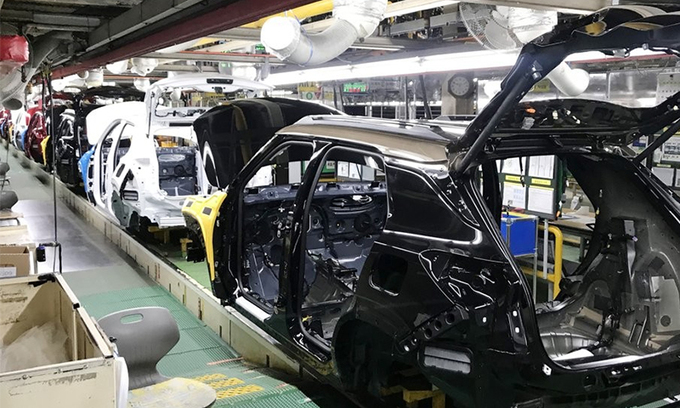Auto demand declines due to corona spread
Companies focus on producing home appliances rather than vehicles
車 Demand Can Not Keep Up With Rapid Recovery
Part of production such as Ford and Volkswagen stopped or cut
Holds a small amount of Hyundai Motor stock Korean GM is less
Vehicle manufacturing costs are likely to rise as prices rise

The production line of the new car’Trail Blazer’ in GM Korea’s Bupyeong 1 factory in Bupyeong-gu, Incheon is stopped. yunhap news
The scarcity of automotive semiconductors is unusual. Amidst global automakers’ production disruptions, domestic companies also took an emergency to secure semiconductors. As it is predicted that the disruption in vehicle production may continue until the second half of the year, automakers are moving in all directions to secure semiconductors.
According to the automobile industry on the 24th, the Korea Automobile Industry Association held an emergency meeting on the supply and demand of semiconductors for vehicles on the 22nd. Major domestic automakers and semiconductor companies participated to discuss the situation and alternatives that are facing difficulties in supply and demand. An official from the association said, “The domestic foundry (consignment production of semiconductors) has not produced semiconductors for vehicles so far,” and said, “A plan to arrange for foreign companies to use the domestic foundry was discussed.”
Semiconductor companies expanded the production of consumer electronics products, which increased consumption, instead of producing automotive products as demand for automobiles decreased last year in the aftermath of the novel coronavirus infection (Corona 19). However, as automobile demand recovered faster than expected, the supply of semiconductors for vehicles could not keep up with demand.
Major automakers have recently stopped their factories because they couldn’t find semiconductors. Germany’s Volkswagen Group predicted that a semiconductor shortage would disrupt production in the first quarter of this year in China, North America and Europe by about 100,000 units. Audi in the group postponed production of high-end models this month, and 10,000 employees went on leave.
Ford, the US’s Louisville, Kentucky sports utility vehicle (SUV) plant, has temporarily stopped production. Stellaantis’ Chrysler, which was recently merged, also temporarily suspended production at its Ontario plant in Canada, and delayed restarting its Mexican plant that produces Jeep. Japanese companies such as Toyota and Honda also announced plans to temporarily cut production.

Businesses and governments are focusing their efforts on securing semiconductors. GM requested the Taiwanese government to secure inventory of semiconductor company TSMC, and ordered component suppliers to secure a year’s worth of automotive semiconductor inventory. The US Automobile Policy Committee also requested the Ministry of Commerce to resolve the semiconductor supply shortage.
In Korea, the factory has not yet stopped, but it is the same that there is no room. It is said that Hyundai Motor Group has a stock of 1-2 months, and GM Korea has less stock. A representative of Hyundai Motor Company said, “We are closely monitoring the situation and are working hard to secure stable inventory through primary suppliers.”
Currently, the number of semiconductors installed per vehicle on sale is about 200 to 300. As various driving assistance functions and infotainment systems are advanced, the necessary semiconductors are also increasing. The automotive semiconductor market is dominated by NXP in the Netherlands, Infineon in Germany, Texas Instruments in the US, and Renesas Electronics in Japan. The price has also increased by about 10% due to the recent supply-demand imbalance.
Song Seon-jae, a researcher at Hana Financial Investment, said, “Even if semiconductor companies expand their production lines in a short period of time, it will take at least 6 months to 1 year.” . Eventually, the vehicle manufacturing cost could increase,” he predicted.
Byungwook Cho, reporter [email protected]
[ⓒ 세계일보 & Segye.com, 무단전재 및 재배포 금지]
